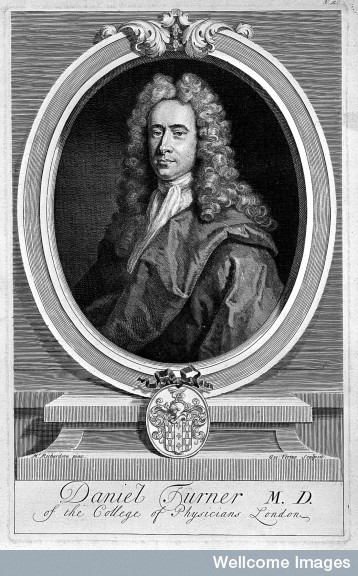
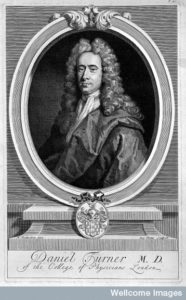 Daniel Turner was born in London, probably, on 18 September 1667. When he grew up he served a two-year apprenticeship under London surgeon Charles Bateman, and a five-year apprenticeship with Thomas Lichfield. In 1691 he joined the Company of Barber Surgeons. In 1711 Turner moved from being a surgeon to be a physician; he became a licentiate of the Royal College of Physicians.1
Daniel Turner was born in London, probably, on 18 September 1667. When he grew up he served a two-year apprenticeship under London surgeon Charles Bateman, and a five-year apprenticeship with Thomas Lichfield. In 1691 he joined the Company of Barber Surgeons. In 1711 Turner moved from being a surgeon to be a physician; he became a licentiate of the Royal College of Physicians.1
In 1724 he published a treatise on venereal disease aptly titled Syphilis. The book describes the causes, symptoms and treatments of the disease, and includes numerous case studies outlining his approach to treating a range of patients. Turner treated men, women and children for the disease. The condition was a tricky one to treat and many of Turner’s cases were complex with developing swellings, ulcers, and gangrene. The cases recorded in this book show that Turner often worked alongside other practitioners. It was not necessarily unusual for groups of practitioners to collaborate on a case. In some cases this was in response to the status of the patient. Nicholas Blundell, for example, often had two or three healers at any one time.2 Patients might call in a second opinion as their disease progressed and things became particularly dire.3
Looking from Turner’s perspective, rather than the patients, it is clear that the same motivations were present but for slightly different reasons. While the patient hoped for a better outcome or better forms of care, Turner’s admission that on several occasions he called for help, or discussed the patient with another practitioner was, in part, a strategy to protect himself and his reputation from harm. A second opinion would corroborate any treatment choices he had made in the event of a bad outcome.
In one case Turner described how the patient was the ‘only Child of an indulgent Mother’ and so had hidden his venereal disease for a long time. This had made his case ‘desperate’ and reduced him to weakness and infirmity. Turner explained that this made his apprehensive about taking the case and so he ‘declin’d meddling’ [refused to treat the patient] ‘unless in Consultation’.
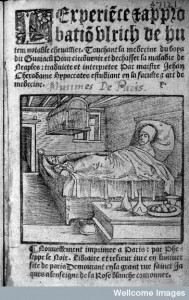
He then called upon two other practitioners – listed only as Dr C. and Dr P. The three physicians then discussed and agreed upon the best course of treatment. This of course meant that faced with a difficult case that might well have gone badly Turner could point out that he had not been solely responsible for the boy’s recovery or demise. This turned out to be a good idea as after a lengthy and difficult series of treatments the patient died from excessive coughing, which burst a vessel in his lungs, brought on by consuming too much wine and too many sausages.4
In another case where Turner’s chosen course of treatment appeared to fail he explained that ‘perceiving no great Amendment [of the patient], a Consultation was resolv’d on, and those two worthy Practitioners Dr. C_w, and Dr. W_ds_th were the Physicians appointed’. Again importantly Turner detailed that after he had described all of the particulars of the case to these two men they ‘were of [the] Opinion we should prosecute our present Method’ – i.e. that he had chosen correctly and they should continue.5 Like the case described above the patient’s condition worsened and the doctors collectively decided that the patient was ‘ a very unfit Subject’ and so they could only provide palliative care.
The way in which Turner described this type of relationship was different to many of the cases in which the patient consulted with him as well as a surgeon or apothecary. In which cases Turner gave the impression that these practitioners would defer to his recommendations or follow his prescriptions. These snippets suggest that Turner relied on the presence of others he considered to be of a similar standing, to mitigate his own responsibility in difficult cases. Thereby limiting the damage that could be done to his own reputation if a patient died.
_____________________
1. Information on Daniel Turner – Oxford Dictionary of National Biography,www.oxforddnb.com, s.v. ‘Daniel Turner’.
2. Joan Lane, ‘“The Doctor Scolds Me”: The diaries and Correspondence of Patients in Eighteenth-Century England’, in Roy Porter (ed.), Patients and Practitioners: Lay Perceptions of Medicine in Pre-Industrial (Cambridge: Cambridge University Press, 1985) pp. 205-48, p. 238.
3. Ibid.
4. Turner, p. 278-283.
5. Ibid, p. 268.
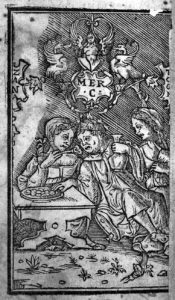

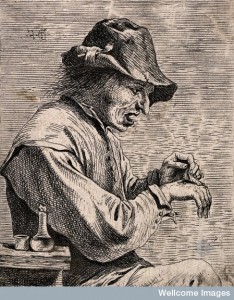

One thought on “Calling for Back Up”
Comments are closed.